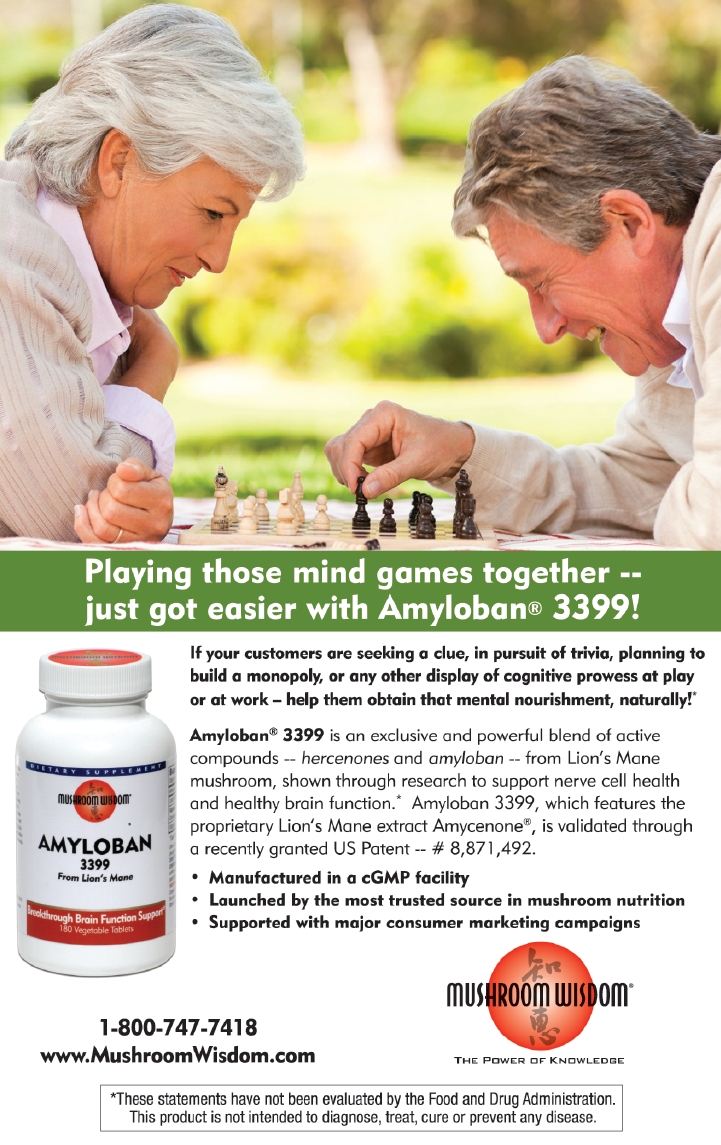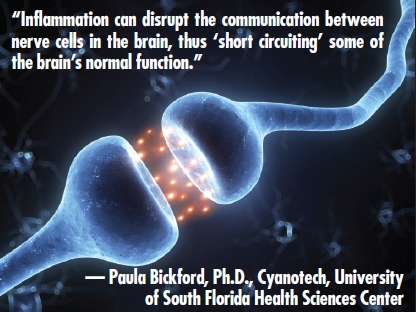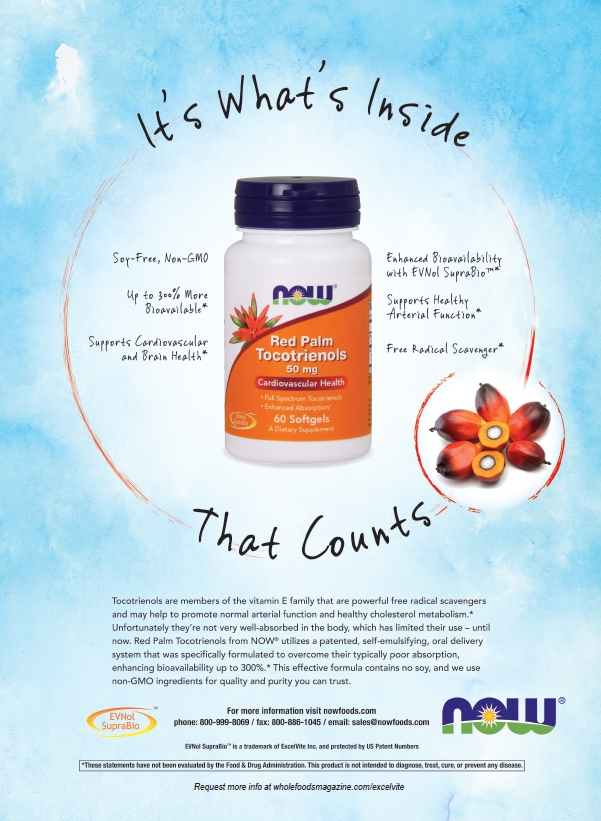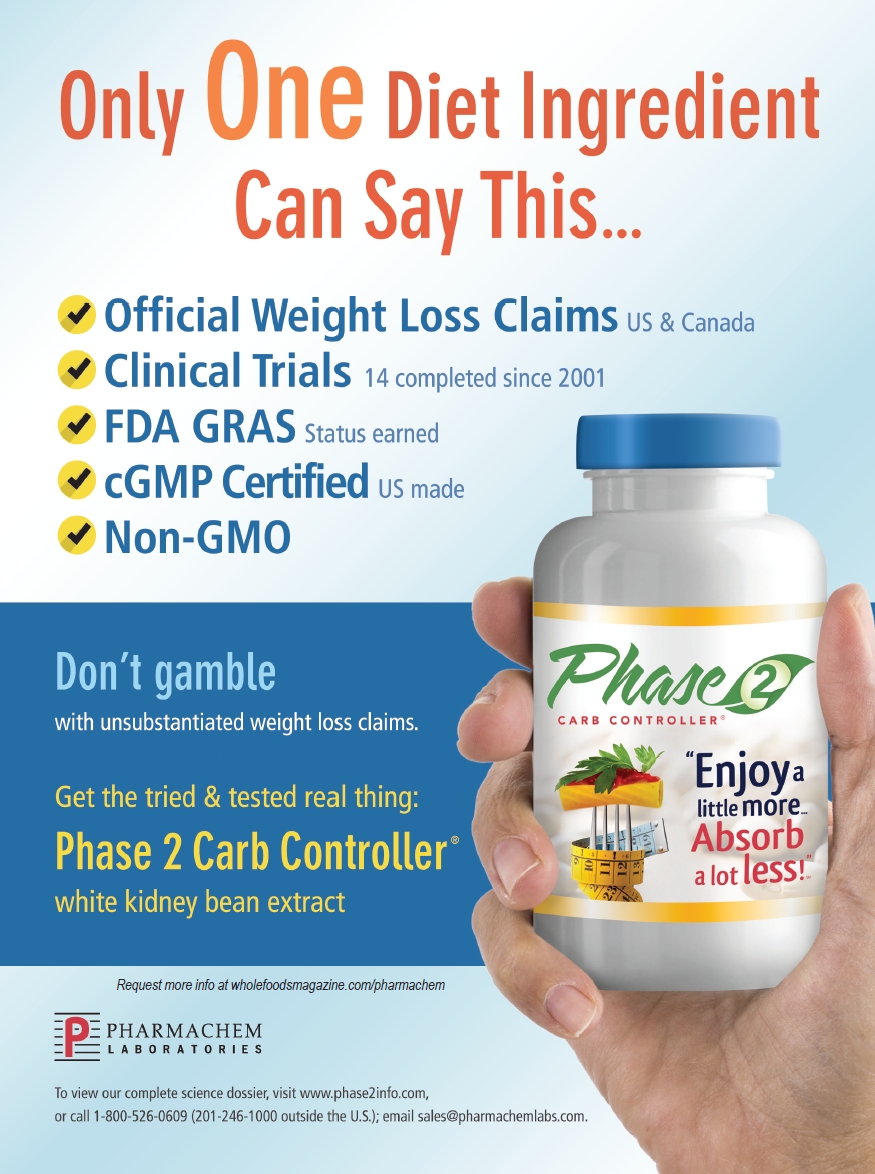Stand outside on a clear night and gaze at the sky. Here in the Northern Hemisphere, you might see up to 4,500 stars. As bountiful as the stars in the skies may seem, the amount pales in comparison to the number of brain cells in humans: approximately 100 billion. And, each and every one is extremely valuable.
These neurons transmit and receive information about everything from movement to heart beats to emotions and more. Feeding the brain the right nutrients will support these key cells and help keep our entire bodies in healthy working order.
Pssss….Don’t Forget This!
The words phosphatidylserine (PS) and phosphatidylcholine (PC) may not roll off the tongue, but it’s vital that you articulate their health benefits to shoppers. Both are phospholipids, critical phosphorus-containing fatty components found in cellular membranes for maintenance and repair.
“These membrane phospholipids play an important role in cell-to-cell communication and the transfer of biochemical messages into the cell,” states Gene Bruno, M.S., MHS, vice president of formulation and scientific oversight at Twinlab Corporation, New York, NY.
PS. PS may not make up the lion’s share of all phospholipids in the body, but Trisha Sugarek MacDonald, B.S., M.S., director of research and development/national educator at Bluebonnet Nutrition Corporation, Sugar Land, TX, calls it “an active partner in cognitive health.”
In fact, the average healthy adult has about half of all his or her PS stored in the brain, says Sugarek MacDonald, “indicating its importance for supporting neurological function.”
PS helps make cell membrane fluid, allowing nutrients to enter cells and waste to exit. In the brain, this function is key for helping neurons send and receive chemical messages needed for learning, memory, glucose metabolism and other functions we rely on for overall wellness. “PS basically increases communication between cells in the brain by acting as a natural emulsifier (compounds that help keep fats suspended in a liquid environment), thereby enhancing the cells’ ability to communicate within the liquid environments of the blood and cellular fluids for optimal brain health,” Sugarek MacDonald explains.
There’s more. PS, along with choline, is a building block for fatty acids in the brain, according to Paula  Bickford, Ph.D., scientific advisory board member at Cyanotech, Kailua-Kona, HI, and a professor of neuroscience at the Center of Excellence for Aging and Brain Repair at the University of South Florida Health Sciences Center.
Bickford, Ph.D., scientific advisory board member at Cyanotech, Kailua-Kona, HI, and a professor of neuroscience at the Center of Excellence for Aging and Brain Repair at the University of South Florida Health Sciences Center.
PS helps the body when it is readily available, but problems arise when levels dwindle, which naturally occurs over time. States Jay Levy, director of sales at Wakunaga of America Co., Ltd., Mission Viejo, CA, “These waning levels may potentially contribute to cognitive dysfunction and memory loss in our later years.”
More than 30 clinical studies suggest PS improves cognitive functions including concentration, memory, attention, learning, behavior and stress management, according to Itay Shafat, Ph.D., senior scientist for the nutrition division at Enzymotec, Ltd., headquartered in Migdal HaEmeq, Israel. He adds that PS is beneficial to all age groups from children to senior citizens and is needed for neuron survival (1).
Levy describes one study in which 78 elderly volunteers took a placebo, 100 mg of PS, or 300 mg of PS daily for six months (2). “Volunteers taking the PS supplement experienced significant improvement in their delayed verbal recall, a cognitive function that falters in the earliest stages of dementia,” he states.
On the other end of the age spectrum, 120 students ages 17–18 took 100 mg of PS or a placebo in another study. After 40 days, memory tests showed the supplemented group had better memory retention than the placebo group (3).
Researchers are working to unlock the mystery of how PS works. Shafat says PS may also activate the cellular mediators of cognition, especially memory (4). “All of the above mechanisms clearly point to the importance of PS for proper brain health and function,” he says.
According to Dallas Clouatre, Ph.D., consultant for R&D to Jarrow Formulas, Inc., Los Angeles, CA, research suggests PS works especially well when taken with DHA. The importance of omegas to brain health will be covered in the next section.
Choline. Choline is a vitamin B-like nutrient needed for healthy brain function. Levy says “choline enhances communication between neurons so they can ‘talk’ to each other more effectively.”
 Choline is the head group of phosphatidylcholine (PC), another important part of cellular membranes and—like PS—a building block for the fatty acids in the brain, states Bickford. Levy says PC supplies the brain with choline, “a nutrient needed for cell membrane integrity and to facilitate the movement of fats in and out of cells.”
Choline is the head group of phosphatidylcholine (PC), another important part of cellular membranes and—like PS—a building block for the fatty acids in the brain, states Bickford. Levy says PC supplies the brain with choline, “a nutrient needed for cell membrane integrity and to facilitate the movement of fats in and out of cells.”
Cheryl Myers, chief of education and scientific affairs at EuroPharma, Inc., Green Bay, WI, adds that PC protects the cell’s energy source (i.e., the mitochondria) from oxidative damage “and especially supports hearing and vision and the processes that keep them working well.”
Some experts believe choline-containing compounds like PC stimulate the body to make the
neurotransmitter acetylcholine. “The brain consumes large amounts of choline for this reason, and an adequate level of blood choline is mandatory for the efficient transport of choline across the blood–brain barrier,” states Shafat.
It should be noted, however, that Bickford believes “the data is not really solid on that anymore. Others think it is related to neurogenesis, but this is also controversial. To sum it up, no one really knows how it works.”
Regardless of how it is synthesized, Sugarek MacDonald explains that acetylcholine “facilitates communication between neuron (nerve) cells, thereby enhancing the brain’s ability to process, retain and retrieve information for healthy cognitive function.”
What this means, according to Herb Joiner-Bey, N.D., medical science consultant for Barlean’s, Ferndale, WA, is that acetylcholine is key for voluntary motor control. Levy adds that choline is so important for this function that “researchers from Tufts University found that elderly people with the highest blood levels of PC had a 47% reduced risk of developing dementia” (5).
Acetylcholine is also a methyl donor, which affects homocysteine levels; large amounts of this substance may be harmful to heart and brain health. Another nutrient that is key for making important phospholipids is citicoline (cytidine 5’-diphosphocholine or CDP-choline). Levy explains that “it replenishes PC and PS and raises the level of chemical messengers needed for voluntary and involuntary actions.” Clouatre adds that citicoline also enhances acetylcholine synthesis.
Elyse Lovett, MS, MBA, marketing manager at Kyowa Hakko, New York, NY, says retailers should tell consumers that “citicoline supports memory function and healthy cognition, enhances communication between the neurons to support visual function, helps protect neutral structures from accumulating free radical damage, supports brain performance by enhancing metabolism, supports healthy brain metabolism by nourishing and maintaining brain cell phospholipids.”
One study on citicoline from the Brain Imaging Center at McLean Hospital used brain scans to see how citicoline affects brain function (6). After six weeks of supplementation, “participants showed increased levels of specific chemical markers for ATP, which confirmed citicoline’s energy-boosting effect in the brain,” says Levy. This may benefit memory, attention and motor skills.
Why Fathead Is a Compliment
The fattest organ in the body is the brain; it contains ~60% fat (7). Consuming healthy fats is important for proper brain function, and nearly all experts support taking omega-3s for this purpose.
 Sugarek MacDonald explains omega-3 fatty acids are part of our cell membranes, and they are important for sending signals to molecules through various hormone-like substances and enzymes, “which are primarily responsible for the positive brain-protective properties associated with omega-3 fatty acids.” Without proper DHA levels in their membranes, cells may not be able to properly transmit electrical impulses.
Sugarek MacDonald explains omega-3 fatty acids are part of our cell membranes, and they are important for sending signals to molecules through various hormone-like substances and enzymes, “which are primarily responsible for the positive brain-protective properties associated with omega-3 fatty acids.” Without proper DHA levels in their membranes, cells may not be able to properly transmit electrical impulses.
Levy adds that healthy fats like omegas make up 70% of the protective myelin sheathing that insulates nerves. “Low levels of these specialized fats have been linked to cognitive problems and memory loss,” he states (8).
Unfortunately, many people aren’t getting enough omega-3s. Becky Wright, marketing director of Aker BioMarine Antarctic US, Issaquah, WA, says the typical Western diet is loaded with omega-6s and lacking omega-3s. “The ratio of omega-6 to omega-3 is about 30:1. In an ideal world, the ratio should really be 4:1,” she states.
While omega-6 fatty acids play a role in brain health, Bruno believes that DHA plays an especially important role for the growth and function of the brain. He states, “Reduced levels of DHA are associated with impairments in cognitive and behavioral performance, research suggests that DHA functions in neurogenesis, neurotransmission and protection against oxidative stress (10).”
Michael Mooney, director of science and education at SuperNutrition, Oakland, CA, is in agreement about this important function of DHA. He states, “DHA also has been shown to stimulate neurite (brain nerve) outgrowth and synaptic development that can repair brain plasticity (11), the ability of the brain to take in new information as well as adapt to newly learned information.” The end result is improved brain plasticity, which helps us continue to learn throughout life.
Mooney also cites an article suggesting that much evidence links fish consumption to better early brain development and less risk of cognitive disorders in late life (12). The researchers build on this literature with a study of 280 middle-aged adults. “Omega-3 fat DHA was associated most strongly with better nonverbal reasoning and working memory with lesser, but interesting associations with vocabulary, nonverbal reasoning and mental flexibility,” he states. Mooney adds that these functions were not found with EPA or ALA.
The elephant in the room with brain health are the various degenerative diseases like dementia (including Alzheimer’s) and Parkinson’s. No supplement can cure, treat or prevent diseases, but it is interesting to consider some preliminary research investigating the role of nutrition in these cognitive issues.
Some researchers believe DHA plays a role in the timing of when symptoms might appear. States Sugarek MacDonald, “DHA has been linked to a slowed progression of Alzheimer’s and associated dementia, agitation and depression and lowered risk of Parkinson’s.”
One reason why may have to do with DHA’s support of healthy inflammation, since both Alzheimer’s and Parkinson’s involve inflammation. Sugarek MacDonald also points out that DHA is a mediated carrier of acetylcholine, which, as discussed previously, is needed for cellular communication.
Numerous studies have illustrated the benefits of using DHA in those with age-related brain health issues. In the important OmegAD study (13), 174 people with mild to moderate Alzheimer’s disease (and being treated with an acetylcholine esterase inhibitor) were given EPAX Omega-3 1000 mg Brain Softgel Formula or a placebo for six months. Thereafter, everyone received the fish oil. “In the first six months, the EPAX subgroup had a statistically significant reduction in memory decline,” says Sugarek MacDonald. “In the second six months, all groups exhibited significantly reduced memory decline.”
 In addition to cognition, many individuals have linked DHA consumption with healthy mood support. “Comparisons of the incidence of depression between populations with significant differences in fish consumption support the assumption that a dietary intake of fish rich in DHA reduces the incidence of depression,” says Sugarek MacDonald. She is quick to point out, however, that many factors affect the development of this condition and “an omega-3 deficiency does not in itself induce disease.”
In addition to cognition, many individuals have linked DHA consumption with healthy mood support. “Comparisons of the incidence of depression between populations with significant differences in fish consumption support the assumption that a dietary intake of fish rich in DHA reduces the incidence of depression,” says Sugarek MacDonald. She is quick to point out, however, that many factors affect the development of this condition and “an omega-3 deficiency does not in itself induce disease.”
Clouatre says that epidemiological findings and clinical trial data suggest that those on a very low-fat diet had surprisingly little reduction in cardiovascular disease. “More startling yet was that deaths from accidents, violence and suicides increased,” he states. Conversely, having high omega-3 levels in the blood is linked with less depression (9).
But the story isn’t just about DHA. David Hart, vice president of marketing for Qualitas Health, Imperial, TX, calls EPA a “functional omega-3” that supports a healthy brain and mood in numerous ways. He cites a meta-analysis in which researchers found a link between low EPA and depression (14). “This meta-analysis showed that EPA, and more specifically unopposed EPA, showed a benefit on depression scale scores,” he states. “This study took a closer look and determined that EPA is the active component of omega-3 PUFA treatment in depressive disorders.”
This study builds on a 2009 meta-analysis of 28 placebo-controlled studies cited by Mooney which “pointed at EPA as also supporting better mood” (15).
But there’s a problem with EPA: the body does not like to store it (unlike DHA). In fact, says Levy, “once EPA enters the brain, it is rapidly oxidized.” Therefore, he recommends consistent supplementation to maintain high blood levels of EPA.
Getting to the source. Now, there’s a bit of debate in the industry about which source best supports brain health. Krill oil proponents like the fact that its DHA and EPA are bound to phospholipids. “Science shows that the phospholipid form (found in krill oil) has superior bio-efficiency (i.e., gets into the cells and tissues quicker and in greater quantities),” states Wright. “Krill oil provides the phospholipid form of EPA and DHA and is better utilized by the body compared to other traditional sources, promoting brain health among other key benefits.”
Shafat agrees and adds another layer to the discussion. Phospholipid-bound DHA may be the form that is best delivered to the brain. He cites a study from Nature identified a specific transporter for the delivery of DHA into the brain, which had “10 times the affinity to DHA when bound as a phospholipid than DHA as free fatty acid” (16). So, in addition to better bioavailability, phospholipid-bound omegas “may also serve as a ‘targeted delivery’ system, ‘marking’ these important fatty acids to be delivered into the brain,” Shafat explains. Phospholipid-bound omegas may also offer better stability against oxidation (17).
 Myers makes the point that phospholipid-bound omega-3 from salmon (as Vectomega) is a source to consider. She believes this form is one of the few for which processing and rancidity do not damage the beneficial DHA and EPA and “their original positions on the carbon chain (sn-2), they are bioidentical—that is, a perfect fit—to the positioning of omega-3 fatty acids in the human brain.”
Myers makes the point that phospholipid-bound omega-3 from salmon (as Vectomega) is a source to consider. She believes this form is one of the few for which processing and rancidity do not damage the beneficial DHA and EPA and “their original positions on the carbon chain (sn-2), they are bioidentical—that is, a perfect fit—to the positioning of omega-3 fatty acids in the human brain.”
In an in-vitro study (18), neurons were treated with DHA from the same phospholipid-bound omega-3 source found in Vectomega for two days and then were exposed to amyloid-beta peptides (substances known to cause the brain cell damage associated with Alzheimer’s), she states. “The study had an intriguing result: the DHA pretreatment greatly increased neuronal survival and reduced damage,” states Myers.
A mountain of research supports the use of fish oil for brain support on everything from memory to mood to cognition, including regarding Alzheimer’s disease. While no supplement can cure or prevent disease, a 2013 paper declares, “Several prospective observational studies now clearly indicate a protective effect of higher fish and DHA intake against risk of Alzheimer’s disease” (19).
As for plant sources, Joiner-Bey believes that only a small amount of DHA is needed to make certain hormones in the brain. “Brain and liver conversion of flax oil ALA into DHA can easily meet this need. Most of the anti-inflammatory work is done by hormones derived from the omega-3 EPA,” he states.
Meanwhile, Mooney says algal DHA might be the best choice for those looking for vegetarian-friendly omegas.
Inflammation on the Brain
Shoppers may associate inflammation with sore joints, but it can play a role in brain health as well. Bickford calls inflammation a key factor that changes in the body when it is affected by certain health conditions and with aging. “Many scientists believe that this has a negative impact on the ability of the brain to resound normally,” she states.
Bickford has studied neurogenesis (i.e., neural tissue growth and development), which she says is related to learning and memory. “Inflammation reduces the ability of the brain to produce new neurons,”Bickford explains. “[Inflammation can] disrupt the communication between nerve cells in the brain, thus ‘short circuiting’ some of the brain’s normal function.”
|
Alzheimer’s Disease: Type-3 Diabetes? As if a diagnosis of diabetes weren’t bad enough, some believe there’s a connection between sugar issues and Since 2005 or so, evidence has been mounting that Alzheimer’s disease is essentially type-3 diabetes (1). Some believe that the build-up of beta amyloid plaques in the brain in place of normal brain cells is key contributor to the develop of the disease—and insulin resistance (like that seen in type-2 diabetics) may trigger these plaques to develop (1). Insulin resistance may also promote oxidative stress and neuroinflammation over time. Plus, some research suggests that type-2 diabetics lose more brain mass with age than a healthy individual, which might contribute to dementia. Others believe there’s another connection: diabetic neuropathy. This condition causes nerve damage because of inflammation caused by high glucose levels. Some say if this damage extends to the spinal cord, Alzheimer’s may be more likely to develop. Insulin helps neurons take in glucose for use as fuel. Insulin also helps regulate neurotransmitters such as those responsible for memory and learning (e.g., acetylcholine). For this reason, a drop in insulin level may impair cognition (2). Some studies have found that those with lower insulin levels are more likely to have Alzheimer’s disease. Moreover, higher glucose levels have been associated with worse memory and a smaller hippocampus (3). “Increased consumption of simple carbohydrates leads to blood brain barrier degradation and subsequently to damage to the hippocampus,” states Dallas Clouatre, Ph.D., consultant for R&D to Jarrow Formulas, Inc. References 1. “Alzheimer’s New Name: Type 3 Diabetes,” Diabetes Health, http://www.diabeteshealth.com/blog/alzheimers-new-name-type-3-diabetes, accessed May 30, 2015. 2. J. Mercola, “Can Sugar Harm Your Brain and Drive Alzheimer’s Epidemic?”, July 24, 2014. http://articles.mercola.com/sites/articles/archive/2014/07/24/sugar-brain-function.aspx, accessed May 30, 2015. 3. T.M. Hsu and S.E. Kanoski, “Blood-Brain Barrier Disruption: Mechanistic Links Between Western Diet Consumption and Dementia,” Front Aging Neurosci. 6, 88 (2014). |
The brain—with its high oxygen consumption—is susceptible to oxidative damage. Oxidative stress and resulting neuroinflammation increases with age, too. Plus, the brain’s high fat content exposes it to the negative effects of lipid peroxidation.
Says Brenda Fonseca, global technical services manager at Kemin Industries, Inc., Des Moines, IA, “There is evidence that the inflammatory events in the brain play a role in the cognitive decline observed with aging.”
Specifically, Bryan See, regional product manager at ExcelVite Inc., Edison, NJ, explains that “Neuroinflammation has been found to be closely followed by neuronal damage, neuronal circuit impairment, leading to neurodegeneration or loss of cognitive function due to prolonged accumulation of neurotoxic pro-inflammatory compounds.”
Stress can actually play a role in unhealthy inflammation levels. According to Myers, data collected by researchers from Cork University Hospital and College in Ireland suggest that the body’s stress responses from the hypothalamic-pituitary-adrenal (HPA) axis also release pro-inflammatory cytokines. Over time, with consistent exposure to stress, one’s brain and behavior may be affected. “This is a much more complex set of factors than the previous ‘brain chemistry only' model,” she states.
When chronic inflammation affects the brain, some say it can be related to diseases like Alzheimer’s (20). Joiner-Bey says, “Systemic inflammation may amplify local inflammation in the diseased brain, exaggerating synthesis of inflammatory compounds and other chemical mediators in the brain. These changes can influence behavior.”
Carolina Burki-Sozzi, director of product development at Horphag Research (exclusive worldwide supplier of Pycnogenol), headquartered in Geneva, Switzerland, adds that some brain inflammation may be linked to depression. “That said, it is still uncertain if inflammation causes depression or vice versa, as there is still much research that needs to be conducted in order to soundly recommend a solution to this link,” she states.
Given the negative effects of unhealthy inflammation levels, brain-supporting antioxidant supplements may be something shoppers want to learn about before problems arise. Says Fonseca, “While a number of studies suggest that various antioxidant supplements can be effective in combating the damaging effects of inflammation and oxidative stress in the brain, there is considerable research is suggesting that the combinations of antioxidant/anti-inflammatory phenolic compounds found in natural plants may provide the best protection as we age.”
One source of these compounds is non-GMO spearmint (Neumentix from Kemin). “Our clinical studies have shown Neumentix to help improve working memory and to also help with attention and the ability to multi-task. These benefits are very important for anyone looking to improve their cognitive performance,” says Fonseca.
Bickford recommends antioxidant-packed astaxanthin (sourced from natural algae), spirulina, blueberries and other brightly colored fruits as ways to keep the brain in tip-top shape. Meanwhile, Wright feels krill oil is a good option since it is rich in astaxanthin as well as phospholipid-bound DHA.
Of course, omega-3s may support healthy inflammation levels and Hart explains why EPA may be especially useful. “EPA can mediate this inflammatory response. EPA competes with arachidonic acid (AA) for two different enzymes, and this competition inhibits creation of pro-inflammatory AA metabolites,” he states.
See says that vitamin E, especially products containing natural full-spectrum tocotrienol complex (EVNol SupraBio), may help “address neuroinflammation through anti-inflammatory properties and by modulating signaling pathway.”
Two studies tested the effect of this tocotrienol complex on stroke-related brain injuries. In one, low concentrations of tocotrienol “prevented glutamate-induced brain cell death, a physiological phenomenon that occurs in the brain during a stroke event,” See explains. He adds treatment with tocotrienol supported the “complete recovery of dying neurons even when tocotrienol was introduced several hours after glutamate challenge” (21).
A separate trial in 121 individuals with white matter lesions (WMLs) found taking the supplement (200 mg twice daily) slowed the development of such lesions (22). “WMLs are closely related to and are indications of fragile brain vascular network, and an independent prognostic measure of future stroke risk and other cognitive health illness,” states See.
 There’s more good news about full-spectrum vitamin E: it may benefit elderly individuals. See says four separate studies (23) found “high blood plasma levels of full spectrum vitamin E (alpha, beta, gamma, and delta-tocotrienol plus alpha, beta, gamma, and delta tocopherol) are associated with improved cognitive functions in very old people.” This might lower Alzheimer’s risk, he believes.
There’s more good news about full-spectrum vitamin E: it may benefit elderly individuals. See says four separate studies (23) found “high blood plasma levels of full spectrum vitamin E (alpha, beta, gamma, and delta-tocotrienol plus alpha, beta, gamma, and delta tocopherol) are associated with improved cognitive functions in very old people.” This might lower Alzheimer’s risk, he believes.
To this list, Levy adds two other key vitamins: “Preliminary research suggests that vitamin K1 and folic acid may also play a role in maintaining healthy brain structure and function. Deficiencies in either nutrient can have a negative impact on the structural components in the brain as well as cognition and behavior.”
Curcumin may be another good choice, since Myers says it is “one of the strongest anti-inflammatories you can get from nature.”
In fact, Myers says research on a branded curcumin blended with turmeric essential oils for better absorption (BCM-95 from DolCas Biotech) suggests the herb may benefit those with major depressive disorder (MDD). She says the ingredient was given to those with some level of depression (per scores of 7+ on the Hamilton Depression Rating Scale); others took the prescription antidepressive fluoxetine (alone or with the curcumin). Myers said those that took the combination had the best improvement of all; but the fluoxetine and curcumin group had nearly the same improvement (24). She states, “this study provides the first human clinical indication that BCM-95 Curcumin may be used as an effective and safe treatment for patients with MDD without causing significant adverse effects.”
French maritime pine bark is another important antioxidant to consider for brain health. Burki-Sozzi says a branded form (Pycnogenol) “was shown to help improve overall cognitive function in the work place, including mental performance, sustained attention and mood.”
In a trial conducted by Chieti-Pescara University, some 30 healthy individuals (ages 35–55) took Pycnogenol (50 mg/three times daily) while 29 others served as a control group. After 12 weeks, researchers found that supplementation improved mood (16%) in the supplement group; the control group’s mood had worsened (–2.1%). The supplement group also had a boost in mental performance (8.9%), attention (13.4%) and memory (3.6%) (25).
Sébastien Bornet, vice president of global sales and marketing at Horphag Research, adds some more perspective on this study: “This study completes a number of research observations indicating that Pycnogenol can naturally help improve some aspects of cognitive functions throughout life.”
 For instance, Bornet says that kids with ADHD who took Pycnogenol had improved symptoms (26). He attributes this effect to Pycnogenol helping produce nitric oxide, which balances stress hormones and lowers adrenaline and dopamine levels. Another study on college students found the supplement helped decrease anxiety before tests and improved mental performance (27). States Bornet, “Researchers suggest that findings may be the result of the extract’s antioxidant potency and blood circulation improvement.”
For instance, Bornet says that kids with ADHD who took Pycnogenol had improved symptoms (26). He attributes this effect to Pycnogenol helping produce nitric oxide, which balances stress hormones and lowers adrenaline and dopamine levels. Another study on college students found the supplement helped decrease anxiety before tests and improved mental performance (27). States Bornet, “Researchers suggest that findings may be the result of the extract’s antioxidant potency and blood circulation improvement.”
Older individuals (ages 60–85) taking Pycnogenol had improved working and spatial working memory during a computerized test. “The research suggests that the antioxidant activity of Pycnogenol played a major role in these results and blood results showed a significant decrease in F2-isoprostanes in nerve cells among those taking Pycnogenol,” says Bornet.
Another botanical, bacopa, contains saponins thought to repair damaged neurons in the brain, according to Levy. One study found that taking bacopa daily for 12 weeks improved memory recall and reduced depression and anxiety (28). “Other studies suggest that bacopa increases mental agility and alertness, improves memory and focus, and increases the ability to grasp new information and skills,” Levy adds.
One outside-the-box supplement to consider is one that supports nerve resilience. Gad M. Gilad, Ph.D., CEO, Gilad&Gilad LLC of Reseda, CA, says nerves may become fragile or damaged due to various physiological and environmental conditions, leading to deficient brain function. This might include problems with mood and cognition. “Unfortunately, there is a glaring scarcity of neuroprotective nutraceuticals for supporting nerve resilience,” he explains. “And while there is an urgent unmet need by millions of Americans for safe and effective solutions, ‘Nerve Health’ as such, is a neglected category by the supplement industry.”
His company believes a proprietary form of agmatine, a metabolite of arginine, can help. Says Gilad, “It’s postulated mechanism of action is so unique, because as a single agent it provides neuroprotection by augmenting, potentially synergistically, multiple molecular targets which underlie the nerve cell’s own capabilities to survive insults.” WF
|
Select Brain Health Supplements
|
||
|
Aker BioMarine Antarctic US: Superba Krill (raw material). Barlean’s: Barlean’s Organic Flaxseed Oil, Barlean’s Signature Fish Oil, Barlean’s Omega Swirl Fish Oils and Flaxseed Oil, Barlean’s MCT Swirl, Barlean’s Olive Leaf Complex, Barlean’s Greens. Bluebonnet Nutrition Corporation: Bluebonnet’s Vegetarian DHA Vegetarian Softgels, Bluebonnet’s EPX Brain Formula Softgels, Bluebonnet’s Power Thought Caplets, Bluebonnet’s Phosphatidyl Choline Softgels, Bluebonnet’s Phosphatidyl Serine Complex Softgels, Bluebonnet’s Taurine Vegetable Capsules, Bluebonnet’s Age-Less Resveratrol Vegetable Capsules, Bluebonnet’s Standardized St. John’s Wort Extract Vegetable Capsules, Bluebonnet’s L-Theanine Vegetable Capsules, Bluebonnet’s EarthSweet Chewables CellularActive Methylfolate Tablets. Enzymotec, Ltd.: Sharp PS, Sharp PS GREEN and Sharp GPC ACTIVE (raw materials). Europharma: Vectomega, CuraMed, Clinical Glutathione and Mental Advantage. ExcelVite: EVNol SupraBio (formerly Tocomin SupraBio) (raw material). Gilad&Gilad: AgmaSet. Horphag Research USA: Exclusive worldwide distributor of Pycnogenol (raw material). HP Ingredients: NeuroActin. |
Jarrow Formulas, Inc.: Alpha GPC (L-alphaglycerophosphatidylcholine), BrainBoost, Citicoline (stabilized CDP Choline [cytidine 5’diphosphocholine]), EPA-DHA Balance (Eicosapentaenoic Acid-Docosahexaenoic Acid Balance), MagMind (Magnesium L-Threonate, or Magtein), MaxDHA, Neuro Optimizer PhosphOmega (Phospholipid-Omega-3 Fish Oil Complex), Phosphatidylserine (PS) [Cogni-PS], trans-Pterostilbene (Dimethylresveratrol), SAM-e (S-Adenosyl Methionine) and Uridine. Kemin: Neumentix Phenolic Complex K110-42 and FloraGLO Lutein (raw materials). Kyowa Hakko: Cognizin Citicoline (raw material). Mushroom Matrix: 100% Organic Mushroom Powder (Hericium erinaceus). Natural Vitality: Natural Calm. Nutrex Hawaii: Line of Hawaiian Spirulina, Greens Complete and BioAstin Hawaiian Astaxanthin. Qualitas Health: Almega PL (raw material). SuperNutrition: SimplyOne Think Clearly. Twinlab Corporation: Vital Memory, PS Gummies. Wakunaga of America: Kyolic Brain Focus, Kyolic Brain Energy, Kyolic Brain Memory and Kyolic Omega-3. |
|
References
1. A. Kato-Katoka, et al., “Soybean-Derived Phosphatidylserine Improves Memory Function Of The Elderly Japanese Subjects With Memory Complaints,” J. Clin. Biochem. Nutr. 47 (3), 246–255 (2010).
2. T. Yong, et al., “Research on Human Memory Enhancement By Phosphatidylserine Fortified Milk,” Chongqing Med. 2011; 30.003. doi: 10.3969.
3. M. Akbar, et al., “Docosahexaenoic Acid: A Positive Modulator Of Akt Signaling In Neuronal Survival,” Proc. Natl. Acad. Sci. 102 (31), 10858–10863 (2005).
4. C. Gianotti, et al., “B-50/GAP-43 Phosphorylation In Hippocampal Slices From Aged Rats: Effects Of Phosphatidylserine Administration,” Neurobiol. Aging. 14 (5), 401–406 (1993).
5. E.J. Schaefer, et al., “Plasma Phosphatidylcholine Docosahexaenoic Acid Content And Risk Of Dementia And Alzheimer Disease: The Framingham Heart Study,” Arch Neurol. 63 (11), 1545–1550 (2006).
6. M.M. Silveri, et al., “Citicoline Enhances Frontal Lobe Bioenergentics As Measured By Phosphorus Magnetic Resonance Spectroscopy,” NMR Biomed. 21 (10), 1066–1075 (2008).
7. “Fascinating Facts You Never Knew About the Human Brain,” http://articles.mercola.com/sites/articles/archive/2009/01/22/fascinating-facts-you-never-knew-about-the-human-brain.aspx, accessed May 28, 2015.
8. A. Nilsson, et al., “Effects of Supplementation With N-3 Polyunsaturated Fatty Acids On Cognitive Performance And Cardiometabolic Risk Markers In Health 51 To 72 Year Old Subjects: A Randomized Controlled Cross-Over Study,” Nutr J. 11, 99 (2012).
9. M. Maes, et al., “Fatty Acid Composition In Major Depression: Decreased Omega 3 Fractions In Cholesteryl Esters And Increased C20: 4 Omega 6/C20:5 Omega 3 Ratio In Cholesteryl Esters And Phospholipids,”J. Affect Disord. 38 (1), 35–46 (1996).
10. S.M. Innis, “Dietary Omega 3 Fatty Acids And The Developing Brain,” Brain Res. 1237, 35–43 (2008).
11. D. Cao et al., “Effects of docosahexaenoic acid on the survival and neurite outgrowth of rat cortical neurons in primary cultures,” J. Nutr. Biochem. 2005 Sep;16(9):538-46.
12. Muldoon MF et al. “Serum phospholipid docosahexaenonic acid is associated with cognitive functioning during middle adulthood,” J. Nutr. 2010 Apr;140(4):848-53.
13. October 2006 issue in th Archives of Nephrology,
14. Sublette et al., 2011, “Meta-Analysis of the Effects of Eicosapentaenoic Acid (EPA) in Clinical Trials in Depression,” J. Clin. Psychiatry
15. Martins JG. “EPA but not DHA appears to be responsible for the efficacy of omega-3 long chain polyunsaturated fatty acid supplementation in depression: evidence from a meta-analysis of randomized controlled trials,” J. Amer. Coll. Nutr. 28(5):525-42 (2009).
16. Nguyen et al, “Mfsd2a is a transporter for the essential omega-3 fatty acid docosahexaenoic acid,” Nature. 2014 May 22;509(7501):503-6
17. Biosci Biotechnol Biochem. 1997 Dec;61(12):2085-8
18. Florent S, Malaplate-Armand C, Youssef I, et al. “Docosahexaenoic acid prevents neuronal apoptosis induced by soluble amyloid-beta oligomers,” J Neurochem. 2006 Jan;96(2):385-95.
19. Cunnane SC, Chouinard-Watkins R, Castellano CA, Barberger-Gateau P: “Docosahexaenoic acid homeostasis, brain aging and Alzheimer's disease: Can we reconcile the evidence? Prostaglandins, leukotrienes, and essential fatty acids,” 2013, 88(1):61-70.
20. Niranjan R. Mol Neurobiol. 2013 Dec;48(3):412-28
21. Rink C, et al. (2011). “Tocotrienol vitamin E protects against preclinical canine ischemic stroke by inducing arteriogenesis,” Journal of Cerebral Blood Flow & Metabolism, 31, 2218-2230.
22. Gopalan Y, et al. (2014). “Clinical Investigation of the Protective Effects of Palm Vitamin E Tocotrienols on Brain White Matter,” Stroke, 45(5), 1422-8.
23. Mangialasche F, et al. (2010). “High Plasma Levels of Vitamin E Forms and Reduced Alzheimer's Disease Risk in Advanced Age,” J Alzheimers Dis., 20(4), 1029-37; Mangialasche F, et al. (2012). Tocopherols and tocotrienols plasma levels are associated with cognitive impairment,” Neurobiology of Aging, 33, 2282-2290; Mangialasche F, et al. (2013, Jun). “Classification and prediction of clinical diagnosis of Alzheimer's disease based on MRI and plasma measures of α-/γ-tocotrienols and γ-tocopherol,” Journal of Internal Medicine, 273(6), 602-21; Mangialasche F, et al. (2013, Dec). “Serum levels of vitamin E forms and risk of cognitive impairment in a Finnish cohort of older adults,” Exp Gerontol, 48(12), 1428-1435.
24. Sanmukhani J, Satodia V, Trivedi J, Patel T, Tiwari D, Panchal B, Goel A, Tripathi CB. “Efficacy and Safety of Curcumin in Major Depressive Disorder: A Randomized Controlled Trial,” Phytother Res. 2013 Jul 6. doi: 10.1002/ptr.5025.
25. http://www.pycnogenol.com/home/detail/study-shows-daily-use-of-pycnogenol%C2%AE-can-improve-memory-focus-decision-making-and-mood/
26. M. Dvoráková et al., “The Effect Of Polyphenolic Extract From Pine Bark, Pycnogenol On The Level Of Glutathione In Children Suffering From Attention Deficit Hyperactivity Disorder (ADHD),” Redox Rep. 11 (4), 163–172 (2006).
27. “Pycnogenol® Found to Improve Memory and Test Scores in College Students,” www.pycnogenol.com/en/media/press-releases/press-releases/pycnogenol®-found-to-improve-memory-and-test-scores-in-college-students, accessed May 30, 2015.
28. Calabrese C, Gregory WL, Leo M, et al. “Effects of a standardized Bacopa monnieri extract on cognitive performance, anxiety, and depression in the elderly: a randomized, double-blind, placebo-controlled trial,” J Altern Complement Med. 2008;14(6):707-13.
29. Belviranli M, Okudan N. “The effects of Ginkgo biloba extract on cognitive functions in aged female rats: The role of oxidative stress and brain-derived neurotrophic factor,” Behav Brain Res. 2015;278:453-61.
30. Tan MS, Yu JT, Tan CC, et al. “Efficacy and adverse effects of ginkgo biloba for cognitive impairment and dementia: a systematic review and meta-analysis,” J Alzheimer’s Dis. 2015;43(2):589-603.
31. Tang LL et al. “Effects of huperzine A on secretion of nerve growth factor in cultured rat cortical astrocytes and neurite outgrowth in rat PC12 cells,” Acta Pharmacol Sin. 2005 Jun;26(6):673-8.
32. Sun QQ et al. “Huperzine-A capsules enhance memory and learning performance in 34 pairs of matched adolescent students,” Zhongguo Yao Li Xue Bao. 1999 Jul;20(7):601-3.
33. Szilágyi G. “Effects of vinpocetine on the redistribution of cerebral blood flow and glucose metabolism in chronic ischemic stroke patients: a PET study,” J Neurol Sci. 2005 Mar 15;229-230:275-84.
34. DeNoble VJ et al. “Vinpocetine: nootropic effects on scopolamine-induced and hypoxia-induced retrieval deficits of a step-through passive avoidance response in rats,” Pharmacol Biochem Behav. 1986 Apr;24(4):1123-8.
35. DeNoble VJ. “Vinpocetine enhances retrieval of a step-through passive avoidance response in rats,” Pharmacol Biochem Behav. 1987 Jan;26(1):183-6.
36. Colin-González AL, Ortiz-Plata A, Villeda-Hernández J, et al. A”ged garlic extract attenuates cereral damage and cyclooxygenase-2 induction after ischemia and reperfusion in rats,” Plant Food Hum Nutr. 2-11;66(4):348-54.
37. Biochemical Journal 25 Nov 2014 as manuscript BJ20140207
38. Serrano, et al. Molecular Neurodegeneration 2014, 9:61
39. Lipids Health Dis. 2011 Aug 19;10:142.
40. “MIT: Magnesium may reverse middle-age memory loss,” Dec. 1, 2004, http://newsoffice.mit.edu/2004/magnesium, accessed June 1, 2015.
41. JAMA. 2015 May 5;313(17):1699-701.)
Published in WholeFoods Magazine, July 2015 (online 6/12/15)












